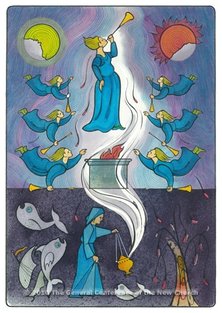
Don McLean, "Waters of Babylon" http://www.youtube.com/watch?v=Gw5Z3jJ6ghs
REFLECTIONS ON THE BOOK OF REVELATION....
In our study of the trumpet angels, we read that as the sixth angel blew the trumpet and a call went out to release the four angels bound at the great river Euphrates.
The Euphrates River, along with the Tigris River, from what is considered the “cradle of civilization.” It is the largest river in Western Asia, snaking its way from the Armenian mountains to the Persian Gulf. It was home to ancient civilizations such as the Sumerians, the Persians and Babylonians. Because it flooded its banks regularly, the Greek historian Xenophon observed that the “Great River” caused the desert to "become a garden of fertility." The “Hanging Gardens of Babylon,” on the Seven Wonders of the Ancient World, was located in Babylon, on the bank of the Euphrates. The Euphrates hosted the great cities of Carchemish, Ur (the ancestral home of Abraham and Sarah) and Babylon flourished.
The Euphrates River waters the Fertile Crescent region where it is believed that the Garden of Eden was located. In fact many believe the Euphrates River was a part of the Garden itself, in some translations called “Parat” (Gen. 2:14). It was also where the first sin was committed; it was where the first lie was told; it was where the first murder was committed; and it was where the first grave was dug. It was in this region where God saw that the wickedness of man was great and so He sent the flood. It was where people attempted to build a tower that would reach into the heavens. As a result,God confounded their languages and scattered the peoples. It was this region where ancient Israel’s most oppressive enemies came from —the Assyrians, the Babylonians, the Medes, and the Persians. The Euphrates was thought to be the Eastern boundary of the Promised Land ( Gen. 15:18; cf. Deut., Joshua 1:4; also 2 Sam. 8:2-14 ; 1 Chron. 18:3 ; 1 Kings 4:24 ). The Euphrates also posed as furthest eastern boundary of the Roman Empire.
The Euphrates was rooted in Paradise. It represents the best and worst of human accomplishment. It reminds us that we were created for beauty and spiritual abundance. We were created with the ability to bring goodness and bear fruit out of our struggles and “desert places.” Yet we are tempted and can easily turn the Garden God intended for us into a place of weeds: corruption, competition and discord. In Revelation, because of sin and evil, the Euphrates is turned into a source of plagues and destruction (9:14). Later in the book, the Great River dries up (16:12). That is what sin does – it destroys and demolishes the good. Instead of being receiving the "living water" sin causes our souls to dry up, become as hard as a sun-baked field.
Even now, we are called to turn things around. To repent. To follow God’s commandments to love our Sovereign Lord and to love each other as we love ourselves.
Joshua said it best:
“But if serving the LORD seems undesirable to you, then choose for yourselves this day whom you will serve, whether the gods your ancestors served beyond the Euphrates, or the gods of the Amorites, in whose land you are living. But as for me and my household, we will serve the LORD. Joshua 24:15”
Prayer: “God of Growth and Renewal, We are sorry for destroying the garden of our soul and the world you have placed us in. Turn our lives from desolate land into an image of your Paradise. Amen.”
 RSS Feed
RSS Feed